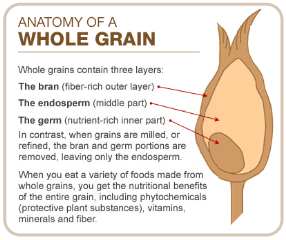 Introducing my friend Kerri Heckert, a Clinical Dietician at the Children's Hospital of Philadelphia, personal trainer and yoga instructor. We thought it was time for a primer on “Carbs”. Everyone seems to have an opinion and she's agreed to write a guest post for me to give everyone a solid starting point (ya know, based on science, not Access Hollywood) from which they can make smarter food choices. Without further ado, here's Kerri!
Introducing my friend Kerri Heckert, a Clinical Dietician at the Children's Hospital of Philadelphia, personal trainer and yoga instructor. We thought it was time for a primer on “Carbs”. Everyone seems to have an opinion and she's agreed to write a guest post for me to give everyone a solid starting point (ya know, based on science, not Access Hollywood) from which they can make smarter food choices. Without further ado, here's Kerri!
Carbs: Not Good or Bad, Just Essential
Carbohydrates have been deemed both the hero and the villain when it comes to nutrition goal-setting. You’ve been told to fill up on whole grains to lose weight, but also to go grain-free to drop a few pounds. As a runner, you’ve carb loaded to maximize glycogen stores, but you may have considered cutting out grains or gluten for a variety of health reasons. With so many media messages, research studies and testimonials bombarding you daily, where do you find the truth?
What Are Carbs Exactly?
Carbohydrates are one of the three macronutrients that make up the human diet (fat and protein are the other two). Carbs are your body’s preferred source of energy. You’ll find them in fruits, vegetables, dairy, bread, pasta, rice, baked goods, candy, nuts, beans and juice. The 2010 Dietary Guidelines for Americans recommend that half of all your grains should be whole grains (100% whole wheat, barley, etc.) The Guidelines also recommend increasing your intake of fruits, vegetables and fat-free or low-fat dairy – all of which have carbohydrates. The Guidelines do recommend limiting intake of added sugars and refined grains.
 Refined grains have been stripped of their nutritional value during processing. They are digested quickly and can spike blood sugar without maintaining fullness. Whole grain products improve satiety, control blood sugar and regulate bowel movements because of their high fiber content. They are also rich in a variety of vitamins and minerals. However, when might a low-fiber, easily digestible carbohydrate food be ideal for a runner? Right before or during a race! Your body would much prefer an immediate source of energy (glucose) without having to digest a whole lot of fiber to get to it. Think: sports drinks, chews and gels.
Refined grains have been stripped of their nutritional value during processing. They are digested quickly and can spike blood sugar without maintaining fullness. Whole grain products improve satiety, control blood sugar and regulate bowel movements because of their high fiber content. They are also rich in a variety of vitamins and minerals. However, when might a low-fiber, easily digestible carbohydrate food be ideal for a runner? Right before or during a race! Your body would much prefer an immediate source of energy (glucose) without having to digest a whole lot of fiber to get to it. Think: sports drinks, chews and gels.
Making Half Your Plate Carbs: A Good Place To Start
Carbohydrates should make up approximately 50-60% of an athlete’s diet. Substantial energy stores must be available to support movement over an extended period of time. Glycogen is the storage form of glucose, and it’s housed mainly in your muscles and liver. Approximately 50-60% of energy during 1-4 hours of continuous exercise at 70% maximum capacity is derived from carbohydrates, and the rest comes from fat. The percentage tips more proficiently towards fat utilization with slower paced aerobic training.
 The Academy of Nutrition and Dietetics and the American College of Sports Medicine recommend 6-10 grams of carbohydrate per kilogram of body weight per day. Exact recommendations vary depending on what point you are at in your training, your daily/weekly mileage and your level of training intensity. See a Registered Dietitian who has experience with sports nutrition to develop a meal plan and recommendations that work best for you, your sport and your goals. (<--- KEY statement)
The Academy of Nutrition and Dietetics and the American College of Sports Medicine recommend 6-10 grams of carbohydrate per kilogram of body weight per day. Exact recommendations vary depending on what point you are at in your training, your daily/weekly mileage and your level of training intensity. See a Registered Dietitian who has experience with sports nutrition to develop a meal plan and recommendations that work best for you, your sport and your goals. (<--- KEY statement)
Sustained Periods of Low Carb = A Big Ol' FAIL
During digestion, the sugars and starches in carbohydrates are broken down into glucose. As blood glucose levels rise, insulin, a transport protein, is released. Insulin escorts glucose into cells where it is converted to energy. The rationale behind low carb diets is that without carbohydrates, the cells will not release insulin, preventing utilization of glucose for energy, thus forcing the body to rely on body fat for fuel. People tend to drop pounds quickly on low-carb diets as their body breaks down glycogen to provide much-needed glucose for energy, and with the glycogen goes water.
Of course, it's a hard diet to sustain and some of the side effects of low carb diets are constipation from lack of fiber, ketosis leading to nausea, dehydration and bad breath as well as nutrient deficiencies. Gross.
As carbohydrates are reintroduced to the diet, hydration improves and water weight will return. Studies have shown that low-carb diet weight loss is actually due to overall calorie deficit rather than elimination of carbohydrates.
Studies have shown that carbohydrate restriction is “detrimental” to athletic performance and that overall inadequate energy intake impedes performance and negates the benefits of training. A body running low on carbohydrate will turn to protein for energy, so protein synthesis (muscle growth and strength) is halted. Very low calorie diets cause muscle loss and decreased strength and endurance. Without adequate energy intake, metabolic rate slows and immune, endocrine and musculoskeletal functions are compromised, prolonging recovery.
So in summary, fuel up! Eat the right kinds of carbs [minimally processed] as part of a nutritious, balanced diet that includes foods from all the different food groups. Eat sufficient calories to fuel the activity you ask your body to perform, and use the best gasoline you can!
Further questions for Kerri? Ask her here or connect with her on LinkedIn here.
References
http://www.cnpp.usda.gov/Publications/DietaryGuidelines/2010/PolicyDoc/PolicyDoc.pdf
http://www.foodmatters.tv/articles-1/why-refined-grains-are-harmful
Links:
Precision Nutrition - Carb Controversy: Why Low-carb Diets Have Got it All Wrong
AND and ACSM Position Stand on Sports Nutrition:
http://journals.lww.com/acsm-msse/Fulltext/2009/03000/Nutrition_and_Athletic_Performance.27.aspx
Whole grains:
http://www.choosemyplate.gov/food-groups/downloads/TenTips/DGTipsheet4MakeHalfYourGrainsWhole.pdf
